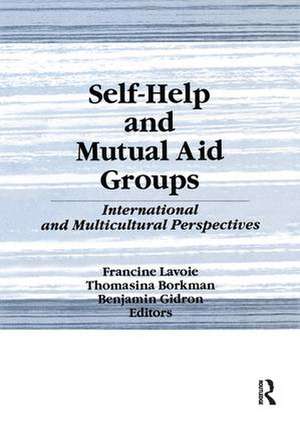Self-Help and Mutual Aid Groups: International and Multicultural Perspectives
Autor Francine Lavoie, Benjamin Gidronen Limba Engleză Paperback – 13 mai 2016
Self-Help and Mutual Aid Groups explores the definition of self-help, the centrality of culture as a major factor explaining variability in self-help, the development of appropriate methodological tools, and the role and involvement of professionals. It brings together different traditions of research for the study of cross- and intercultural and inter- and intraorganizational aspects of self-help groups. Contributors who represent various disciplines, including psychology, sociology, social work, and nursing, discuss:
- a paradigm for research in self-help
- the development of self-help groups in Japan, Hong Kong, and the former East Germany
- the participation of blacks in Alcoholics Anonymous
- the participation of Mexican Americans in groups for parents of the mentally ill
- relationships between self-help groups and health professionals
- predictors of burnout in self-help group leaders
- characteristics of effective groups
- ways individuals change their world view through self-help participation
Self-Help and Mutual Aid Groups is an informative and helpful resource for self-help researchers and teachers, students, and professionals who want to be more effective in their work with self-help groups across cultural and national lines.
Preț: 290.67 lei
Preț vechi: 334.02 lei
-13% Nou
Puncte Express: 436
Preț estimativ în valută:
55.62€ • 58.07$ • 46.03£
55.62€ • 58.07$ • 46.03£
Carte tipărită la comandă
Livrare economică 04-18 aprilie
Preluare comenzi: 021 569.72.76
Specificații
ISBN-13: 9781138996038
ISBN-10: 1138996033
Pagini: 384
Dimensiuni: 148 x 210 mm
Greutate: 0.45 kg
Ediția:1
Editura: Taylor & Francis
Colecția Routledge
Locul publicării:Oxford, United Kingdom
ISBN-10: 1138996033
Pagini: 384
Dimensiuni: 148 x 210 mm
Greutate: 0.45 kg
Ediția:1
Editura: Taylor & Francis
Colecția Routledge
Locul publicării:Oxford, United Kingdom
Public țintă
Professional Practice & DevelopmentCuprins
ContentsPreface
- Universal and Particular Attributes of Self-Help: A Framework for International and Intranational Analysis
- Participatory Action Research as a Strategy for Studying Self-Help Groups Internationally
- Self-Help Groups in Japan: Trends and Traditions
- The Development of Self-Help in Germany’s New Provinces (Former East Germany): The Case of Schwerin
- Advocacy on Self-Help for Patients With Chronic Illness: The Hong Kong Experience
- Mexican American and Anglo American Parents of the Mentally Ill: Attitudes and Participation in Family Support Groups
- Are Twelve Step Programs Appropriate for Disenfranchised Groups? Evidence From a Study of Posttreatment Mutual Help Involvement
- Understanding Worldview Transformation in Members of Mutual Help Groups
- Partnerships Between Health Professionals and Self-Help Groups: Meanings and Mechanisms
- Predictors of Burnout Among Self-Help Group Leaders
- Social Climate Correlates of Effectiveness in Alliance for the Mentally Ill Groups
- The Involvement of Self-Help Groups With Mental Health and Medical Professionals: The Self-Helpers’ Perspective
- Workshop on “Good Practice” in the Collaboration Between Professionals and Mutual Aid Groups
- Self-Help Group Participation Among People With Severe Mental Illness
- Conclusion
- Index
- Reference Notes Included
Notă biografică
Francine Lavoie, Benjamin Gidron
Descriere
Here is new information on the development of international and intercultural research on self-help groups. This book reflects the many developments which have occurred in the field over the past decade, emphasizing empirical research. Self-Help and Mutual Aid Groups provides specific research findings and honed concepts to help health professionals learn more about self-help groups and work effectively with such groups. More countries and ethnic groups are now involved in the self-help movement, and this volume increases knowledge of how different cultures react to and participate in self-help mutual aid and how self-help groups can be adapted to fit different racial or ethnic populations.
